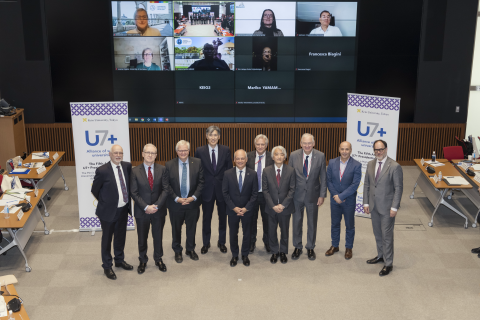
U7+ Alliance: Universities call on G7 leaders to prioritise and advance peace and security
As the G7 prepares to convene in Hiroshima, the world faces significant challenges to peace and security. Armed conflict or threats of conflict in many regions have resulted in violations of human rights and, for the first time in a generation, the open threat of nuclear warfare.
Within this context, more than 75 university leaders from 16 countries convened at Keio University in Japan this week and called on G7 leaders to invest in peace and security education at all levels, incorporate the latest research into policy on peace and security, diversify the set of stakeholders involved in high-level policy discussions on peace and security, lower barriers to student exchanges that foster cross-cultural understanding, and defend academic freedom.
“The world has seen significant innovation in warfare; it is now time for innovation in peace and security,” a statement from the U7+ Alliance reads. It calls for “comprehensive, long-term and complex understandings of the patterns and processes that lead to sustainable peace, including strong institutions, economic stability and social inclusion.”
“Education and knowledge creation are vital to building peaceful and sustainable democracies. To address the global challenges we face, we need collaboration and partnership among universities, governments, communities and industries to foster deeper understanding and greater trust among citizens,” said Professor Meric Gertler, President of the University of Toronto and Chair of U7+ Presidential Steering Committee.
The presidents of the U7+ universities formally committed to take action to support the G7 agenda and contribute to fostering a more peaceful and secure world through research, education and public engagement during this week’s U7+ Presidential Summit at Keio University in Tokyo, Japan. These commitments were outlined in the U7+ Tokyo Statement: Universities as Engines of Innovation for Peace and Security, which was unanimously adopted by the presidents. The statement was delivered to Japanese Prime Minister Fumio Kishida on Wednesday 15 March in his capacity as 2023 host to the Group of Nations (G7).
The U7+ Presidential Summit is the annual meeting of the U7+ Alliance, the first coalition of university presidents from Europe, Asia, North America, South America, Africa and Australia dedicated to defining concrete, collective actions universities can take to address global challenges, in coordination with government leaders in G7 countries and beyond. The inaugural meeting of the Alliance was hosted by Sciences Po in Paris in 2019, with the support of French President Emmanuel Macron. Northwestern University serves as home to the Secretariat for the Alliance. The University of Toronto currently chairs the Presidential Steering Committee (2022-2025), whose members also include Georgetown University, Keio University, University of Mannheim, Université de Montréal and Sciences Po.
At this week’s Summit themed “The Pen is Mightier than the Sword,” U7+ Alliance members committed to provide students with opportunities to learn about the causes of conflict and methods of peacebuilding, share research on issues of peace and security with policymakers and the public, provide students and scholars displaced by conflict, persecution and humanitarian crises with opportunities to teach and learn on their campuses, and collaborate with G7 and United Nations bodies devoted to preventing conflict.
The U7+ commitments align with a long history of a dedication to fostering peace within academia. “The founder of Keio University, Yukichi Fukuzawa, once wrote, ‘And as our associations broaden, the closer become the bonds between us. One country cannot rashly wage war against another, for the rights of nations are guaranteed under international law,’” explains Kohei Itoh, President of Keio University. “It is the aim of universities to avoid wars and to work to create a peaceful and progressive society through diplomacy that is driven by learning and human interactions. This is the mission of Keio University. It is what unites us to the spirit of the U7+ Tokyo Statement.”
“It’s time for universities around the world to step up and collaborate across national borders to invest in research and education devoted to a sophisticated understanding of the parameters and pathways of peace,” said Annelise Riles, Northwestern University Roberta Buffett Institute for Global Affairs Executive Director and Associate Provost for Global Affairs. “Crucially, this means leveraging transnational university networks to ensure that differing national perspectives and concerns are reflected in research and practice rather than taking one national perspective as universal.”
Read the press release issued by the U7+ Alliance
“As a member of the U7+ Alliance, Université Paris-Saclay fully supports this declaration. Around the world, universities promote the sharing of high-level and verifiable scientific work, protected by academic freedom. Universities have a part to play in informing citizens, and in providing keys to scientific understanding to shape public policies. As pillars of democratic debate, through their work in teaching, research and innovation, universities help us to gain a better understanding of the major challenges we face today, and play an active role in creating lasting solutions to build a fairer and more humane society.”

